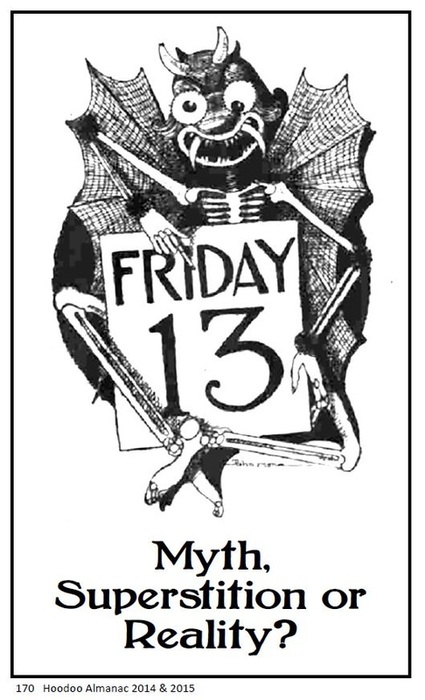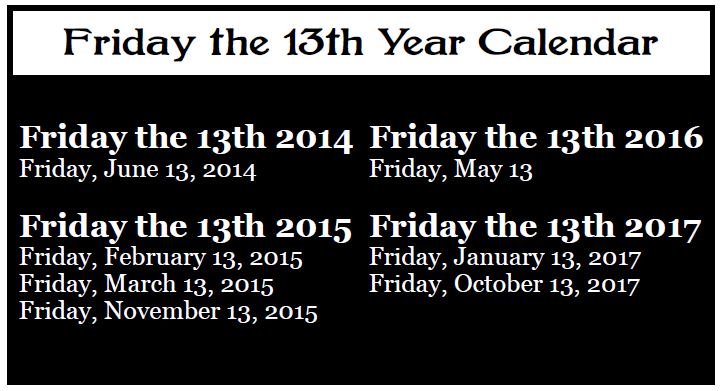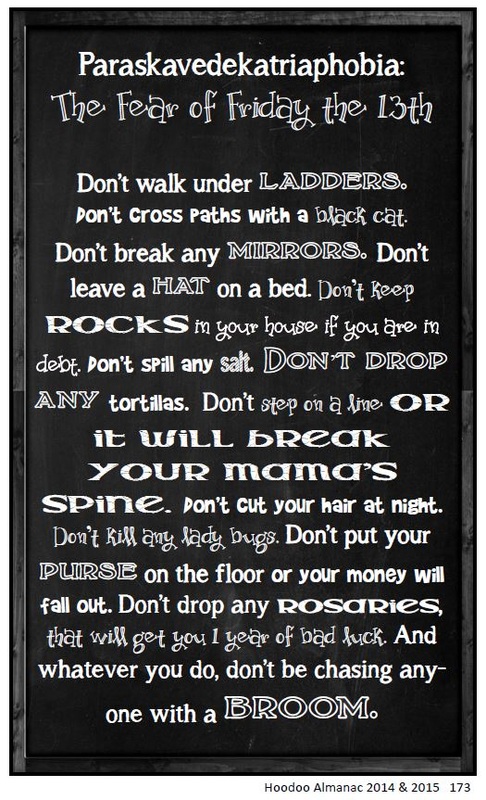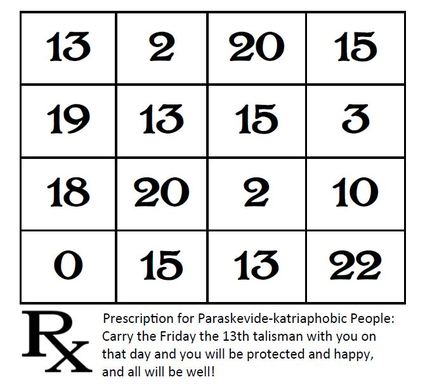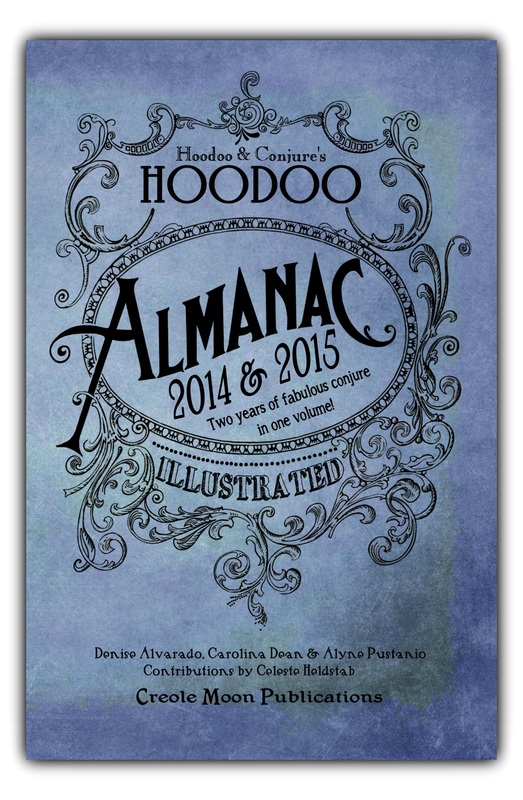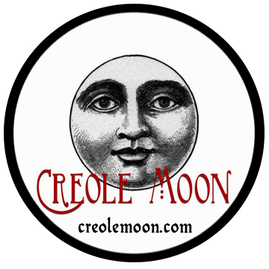FOLKLORE
FRIDAY THE 13th: MYTH, SUPERSTITION, OR REALITY?
Denise Alvarado
The fear of number 13 is the most common superstition in Western culture.
One of my earliest memories about Friday the 13th as a day other than what is commonly portrayed in the media was when we were in Germany at an army base where my father was stationed. I remember it well; it was a sunny day and I was sitting on the grass outside. A soldier whom I did not know walked by me, looked at me and said “Happy Red Day.” I remember thinking to myself...what is he talking about? And then I remembered it was Friday the Thirteenth, and it must be something about this day that he is referring to.
But why did he say that to me? I still don’t know the answer to that question; but, what we did find out was that he was the resident Satanist who was on a mission to infiltrate my life at the ripe young age of, oh yeah, did I mention...13?
Sounds like the beginnings of a scary movie, right? Well, nothing crazy happened, we did get to know him a little and get inside the thinking of a Satanist in the army in Germany at that time. My mother never let me be alone with him and instead engaged in a useful dialogue that prompted me to learn more about the meaning of this “Red Day.”
But why did he say that to me? I still don’t know the answer to that question; but, what we did find out was that he was the resident Satanist who was on a mission to infiltrate my life at the ripe young age of, oh yeah, did I mention...13?
Sounds like the beginnings of a scary movie, right? Well, nothing crazy happened, we did get to know him a little and get inside the thinking of a Satanist in the army in Germany at that time. My mother never let me be alone with him and instead engaged in a useful dialogue that prompted me to learn more about the meaning of this “Red Day.”
The Origin of Friday the 13th
Apparently, there is no definitive date for the origin of the dreaded day of special misfortune. While there is evidence to suggest that the number thirteen was considered unlucky prior to the 20th century, there is no definitive link between Friday and the number 13, or so “they” say. I used to take that at face value, but not so much anymore. Actually, when you consider all of the origin stories, there are all kinds of connections between Fridays and thirteens.
There are some who insist that Friday the 13th is a modern conceptual invention. According to this theory, the first recorded mention of a Friday the 13th occurred in 1907 with the publication of Thomas W. Lawson's popular novel, Friday, the Thirteenth. The storyline of the book tells of a stockbroker who exploits the superstition to create a panic on Wall Street on Friday the 13th. Obviously, it doesn’t make sense that this book is the first mention of Friday the 13th, because the author had to draw from earlier superstitious beliefs about Friday the 13th to propel the plot of the novel. In my mind then, this origin story is crossed off the list.
There are some who insist that Friday the 13th is a modern conceptual invention. According to this theory, the first recorded mention of a Friday the 13th occurred in 1907 with the publication of Thomas W. Lawson's popular novel, Friday, the Thirteenth. The storyline of the book tells of a stockbroker who exploits the superstition to create a panic on Wall Street on Friday the 13th. Obviously, it doesn’t make sense that this book is the first mention of Friday the 13th, because the author had to draw from earlier superstitious beliefs about Friday the 13th to propel the plot of the novel. In my mind then, this origin story is crossed off the list.
So, what’s the deal then? Well, another theory is proposed by Donald Dossey, founder of the Stress Management Center and Phobia Institute in Asheville, North Carolina. According to Dossey, who is also a folklore historian, the phobia associated with Friday the 13th is the result of an ancient combination of two separate negative associations with the number 13 and the day Friday. Okay, so if something bad happens on a Friday, and it happens to be the 13th, then...that make Friday the 13th a day for bad luck? Well, considering bad things have happened to people on every other day of the week and on every other date as well, there’s got to be more to it than that. But, I do understand the psychology behind this explanation.
Some suggest Friday has always been considered to be an unlucky day. For example, there is the reference made by Chaucer in his 14th century book The Canterbury Tales, where he states Friday is considered a day of misfortune and ill luck: “...and on a Friday fell all this mischance.” Another explanation is based on the Christian belief that Jesus was crucified on a Friday. I can certainly agree this was a bad day for Jesus.
But wait, there’s more! We can’t overlook Wall Street’s perpetuation of the superstition for decades. On Oct. 13, 1989, Wall Street experienced what was at the time the second largest drop of the Dow Jones Industrial Average in history. As a result, the day was nicknamed the Friday-the-13th mini-crash.
And finally, we can’t let Hollywood off the hook. “Fridays will never be the same again” was the tagline to Paramount Pictures 1980 release of Friday the 13th, starring Jason, every horror movie buff’s favorite slasher. Born on Friday the 13th, Jason chooses to make that day ever more meaningful by seeking revenge on folks who are similar in behavior and appearance to those who allowed him to drown in Crystal Lake.
But long before the Friday the 13th mini crash of 1989, Lawson’s 1905 novel Friday the Thirteenth, and Jason, for that matter, we find peculiar associations with the number 13. For example, it is curiously omitted in the list of laws in ancient Babylon's (circa 1772 BC) Code of Hammurabi. No one seems to know what the reason was for the omission. And, there is an age-old myth that if 13 people dine together, one will die within a year. The myth is said to derive from both the Last Supper, when Jesus dined with the 12 Apostles prior to his death, and a prevalent Norse myth.
Some suggest Friday has always been considered to be an unlucky day. For example, there is the reference made by Chaucer in his 14th century book The Canterbury Tales, where he states Friday is considered a day of misfortune and ill luck: “...and on a Friday fell all this mischance.” Another explanation is based on the Christian belief that Jesus was crucified on a Friday. I can certainly agree this was a bad day for Jesus.
But wait, there’s more! We can’t overlook Wall Street’s perpetuation of the superstition for decades. On Oct. 13, 1989, Wall Street experienced what was at the time the second largest drop of the Dow Jones Industrial Average in history. As a result, the day was nicknamed the Friday-the-13th mini-crash.
And finally, we can’t let Hollywood off the hook. “Fridays will never be the same again” was the tagline to Paramount Pictures 1980 release of Friday the 13th, starring Jason, every horror movie buff’s favorite slasher. Born on Friday the 13th, Jason chooses to make that day ever more meaningful by seeking revenge on folks who are similar in behavior and appearance to those who allowed him to drown in Crystal Lake.
But long before the Friday the 13th mini crash of 1989, Lawson’s 1905 novel Friday the Thirteenth, and Jason, for that matter, we find peculiar associations with the number 13. For example, it is curiously omitted in the list of laws in ancient Babylon's (circa 1772 BC) Code of Hammurabi. No one seems to know what the reason was for the omission. And, there is an age-old myth that if 13 people dine together, one will die within a year. The myth is said to derive from both the Last Supper, when Jesus dined with the 12 Apostles prior to his death, and a prevalent Norse myth.
Blame it on Loki
Okay, so let’s blame it on the trickster. Apparently, twelve gods were having a dinner party at Valhalla, the majestic Norse hall presided over by Odin and where half of those who die in battle go to upon death. An uninvited 13th guest arrived, the mischievous Loki. Ever the trickster, Loki manipulated Hoder, the blind god of darkness, to shoot the god of joy and gladness, Balder the Beautiful, with a mistletoe-tipped arrow.
After Hoder shot Balder, the whole earth grew dark. Balder died and all of Earth mourned. It was an awfully unlucky day. Since then, the number 13 has been considered ominous and foreboding.
After Hoder shot Balder, the whole earth grew dark. Balder died and all of Earth mourned. It was an awfully unlucky day. Since then, the number 13 has been considered ominous and foreboding.
The DaVinci Code
Loki could be the end of it, but just for shits and giggles let’s take a look at a theory made famous through the DaVinci Code. In the book, a connection is drawn between the slaughtering of the Knights Templar by the Church and Friday the 13th. The Knights Templar were the wealthy, powerful and legendary order of warrior monks formed during the Christian Crusades. Historically, the arrest of Jacques de Molay, the Grand Master of the Knights Templar, did occur on Friday, Oct. 13, 1307. The event marked their demise by the Church and state for fictitious crimes such as heresy, blasphemy, various obscenities, and homosexual practices. Hundreds of members of the Order died excruciating deaths by torture and burning at the stake. Friday the 13th was indeed an unlucky day for the Knight’s Templar.
Obviously, it is impossible to determine the exact origin of the superstition surrounding Friday the 13th. That said, there are innumerable superstitions related to this day and date that warrant mentioning simply because people observe them—a LOT of them—and they aren't going away any time soon. The graphic to the left has a nice collection of superstitions indicating bad luck associated with the day and date. But what about good luck? |
Is There Such a Thing as Lucky 13?
Consider this, despite its bad luck associations in superstition, the number 13 is considered in a positive light in esoteric traditions. It is the number of mystical manifestation. For example:
- The teachings of Jesus are centered on the formula of 12 + 1 (Jesus plus his 12 disciples). According to Pythagoras, one added to 12 creates the unlimited number of 13. It is this formula that allows miracles such as the multiplication of fish and loaves.
- Thirteen is the number of the Great Goddess, represented by 13 lunar cycles to a year.
- Contemporary witches consider thirteen to be a lucky number.
- In the Kabbalistic system, numbers are equated with letters, and the number 13 is equated with love and unity since the Hebrew letters for love and unity both equal 13.
- Thirteen is the cosmic law of destiny: death through failure and regeneration.
- And hey, let's don't forget the Baker's Dozen...Okay, so that's not esoteric, but it is a good thing, right? I mean, who doesn't like an extra donut?
Superstition or Reality?
Clearly, there are many explanations for the association between Friday and the number 13; yet, none of them adequately answer the question regarding the absolute origin of the superstition. We’ve looked at origin stories and superstitions and beliefs, both bad and good. It’s prevalence is undeniable. However, the whole topic warrants another question. Is there anything to it?
Indeed, inquiring minds want to know. Friday the 13th has been the subject of formal research. One way to measure whether or not an actual phenomenon exists is to analyze statistical data related to the prevalence of traffic accidents and hospital admissions that occur on Friday the 13th as compared to other days of the week.
According to research completed at the Dutch Centre for Insurance Statistics in 2008, there were fewer accidents and reports of theft or fire on Friday the 13th than on other Fridays.
On the other hand, there is this bit of information published on News.com.au website:
Indeed, inquiring minds want to know. Friday the 13th has been the subject of formal research. One way to measure whether or not an actual phenomenon exists is to analyze statistical data related to the prevalence of traffic accidents and hospital admissions that occur on Friday the 13th as compared to other days of the week.
According to research completed at the Dutch Centre for Insurance Statistics in 2008, there were fewer accidents and reports of theft or fire on Friday the 13th than on other Fridays.
On the other hand, there is this bit of information published on News.com.au website:
One of the few reputable research papers on the matter - published in the British Medical Journal in 1993 - found that there was a higher risk of road accidents on Friday the 13th than on other Fridays. It found the risk of hospital admission as a result of a transport accident may be increased by as much as 52 per cent on Friday the 13th, compared to Friday the 6th.
Another study on the topic, conducted by Professor Simo Nayha from Finland's University of Oulu in 2004, found women in particular were at higher risk of dying in a road accident on Friday the 13th, compared with other Fridays. And he offered this conclusion: "Friday the 13th may be a dangerous day for women, largely because of anxiety from superstition.
Whatever—don’t get me started on the female focus of the latter research which is annoyingly reminiscent of the 19th-century-no-longer-recognized medical diagnosis of female hysteria. The problem with conducting research on Friday the 13th, aside from possible gender bias, is that it is impossible to control specific variables. For example, some people take extra caution when doing anything that day, whether they are driving or taking a shower. Still others simply avoid going out altogether. Surely these conditions would affect the outcome of any research regarding the incidence of accidents on Friday the 13th.
Friday the 13th Talisman
Friday the 13th always occurs at least once a year in the Gregorian calendar and can appear up to three times in any one year. In 2015, there will be three incidences of the dreaded day: February 13, March 13 and November 13. So, is there anything that can be done to prevent possible bad luck for believers?
Fortunately for paraskevidekatriaphobics, a number of remedies exist. You can escape to high ground, stand on your head and eat a piece of gristle (yum!) or burn all of your socks with holes in them for protection from inevitable. Or, you can carry the Friday the 13th lucky talisman.
Talisman magick goes back infinitesimally in the civilization of humankind, or by some estimates over 4,120 years. A talisman is a small amulet or other object, often bearing magical symbols, worn for protection against evil spirits or the supernatural.
There are the interesting talismans that are said to protect us from the evils of Friday the 13th. An 1896 Illinois newspaper article reports on the sale of rabbits’ feet decorated in gold to help ward off the “voodoo of Friday the 13th.” Another form of talisman is the magic square. A magic square is a 4 x 4 square with the sum of each of 4 rows, 4 columns and 2 diagonals always the same, "magic" total. They are found in a number of cultures, including Egypt and India, engraved on stone or metal and worn as talismans, the belief being that magic squares have astrological and divinatory qualities, their usage ensuring longevity and prevention of diseases.
Lucky for the paraskevidekatriaphobic there is a magic square to protect you from the evil and unfortunate events that seem to befall folks on the fated day. Pictured above in all its glory is a magic square for the year 2015. Feel free to copy it, print it out, and carry it with you, should you feel the need. For an extra protection boost anoint it with Fiery Wall of Protection and write the prayer of protection to St. Michael on the back and you will be unstoppable.
Bonne chance and good luck on Friday the 13th, wherever you are!
References
Guiley, R.E. (1999). The Encyclopedia of witches and witchcraft. New York: Checkmark Books.
Roach, John. "Friday the 13th Phobia Rooted in Ancient History", National Geographic News, August 12, 2004, p. Page 1. Retrieved on July 13, 2007
http://en.wikipedia.org/wiki/Friday_the_13th
Guiley, R.E. (1999). The Encyclopedia of witches and witchcraft. New York: Checkmark Books.
Roach, John. "Friday the 13th Phobia Rooted in Ancient History", National Geographic News, August 12, 2004, p. Page 1. Retrieved on July 13, 2007
http://en.wikipedia.org/wiki/Friday_the_13th
* This article is an excerpt from Friday the 13th: Myth Superstition or Reality? by Denise Alvarado, in the Hoodoo Almanac 2014 and 2015. If you liked this article, there are a ton more in the Hoodoo Almanac 2014 and 2015.
|
The HOODOO ALMANAC 2014-2015 is the third edition of the very first almanac published in the world that focuses on southern folk magic, conjure and rootwork, Native American conjure and African-derived traditions. A veritable treasure trove of facts and information for conjurers and the curious alike. For example, we have expanded out calendar section to include the following calendars:
Civic Holidays and Observances. This is our calendar of days formally recognized by the federal government such as Memorial Day and Independence Day.
Popular Holidays and Observances. This calendar includes days that are recognized by a large segment of the general public, like Mardi Gras and Valentine’s Day.
Pagan Sabats, Esbats and Observances. This calendar includes observances of the Western hemisphere such as lunar cycles, seasons, the 8 sabats and the pagan deity festivals celebrated by pagans, Wiccans, and Witches.
Religious Holidays and Observances. This calendar includes religious holidays and observances of the Christian, Jewish, Islam and Buddhist faiths.
Voudou Holidays and Feast Days. This calendar includes feast days of the loas and orishas as observed by Haitian Vodou and New Orleans Voudou. These days my vary according to individual houses and temples; however, the ones we provide are commonly recognized.
Hoodoo Notable Days and Observances. Of course, we are the first to introduce a Hoodoo calendar and so our calendar is subject to those days we feel are important to African American history as it relates to the practice of Hoodoo and rootwork. We have included birthdays of notable people in Hoodoo history as well as some of the saints and folk saints found on altars of practitioners nationwide.
Spiritualist Feast Days and Observances. This calendar includes the feast days and observances of the Spiritualist Churches. There are variances between Churches depending on the specific spirits served in the respective Churches; but, we have included those days that seen to be common among all Churches and in particular those found in the New Orleans area.
Calendar of Catholic Saints. We anticipate this particular calendar to be among our most popular as it is the most heavily requested category of information through our website. Because there are literally thousands of saints there is no way to include them all here, so we have focused on those saints that are among the most popular with Catholics, New Orleans Voudouists and Hoodoo practitioners who incorporate them in their practice.
Calendar of Folk Saints. Since the calendar of Catholic Saints is so extensive, we have separated the folk saints into their own category. We have expanded our inclusion of Latin American folk saints - both those who are not recognized by the Catholic Church and others who have a history of cultural relevance in their regions of origin.
Rootworker Conjure Calendar. This is our calendar of general information of gardening tips and conjure tricks with plants, herbs and roots. Depending on where you live, of course, will determine the best times for growing and harvesting herbs in your area so you will need to take that into consideration.
Beyond our awesome calendar pages, we have our seasonal lore and miscellany and several articles on numerology, lucky lotto and a special guide to dreams and lucky numbers. We've got herbal tea remedies courtesy of Celeste Heldstab, our guest contributor, prayers to the seven saints of New Orleans, old-tyme conjure dirts and dusts, traditional methods for preventing conjury, communicating with spirits, weather lore and proverbs and a plethora of tips and tricks for the modern day practitioner.
But wait! That's not all! We have profiles of notable African Americans Susie King Taylor, Sarah Breedlove Walker and Henry Bibb!
AND
An introduction to Honey Jars, conjure oil formulas, curious conjure receipts and down home southern recipes with a magickal flair!
And just when you think there can't possibly be anything more, just wait until you see just how much more we have waiting for you!
If you are a serious lover of authentic southern folk magic and folk lore, you will love the Hoodoo Almanac 2014-2015. If you are simply curious, you will be forever entertained by the Hoodoo Almanac 2014-2015. On thing is for certain, and that is whoever has a copy of the Hoodoo Almanac 2014-2015 will have the edge on their competitors and will surely fill up their personal trick bags. Because we have information in this book that you won't find in one place anywhere else in the world.
Hoodoo happens outside the ordinary person’s comfort zone. But, in the HOODOO ALMANAC, we don’t hide conjure. We parade it in the streets and give it a sweet tea.
MAGIC, PURE MAGIC. THE HOODOO ALMANAC 2014-2015.
Available on Amazon.com
Civic Holidays and Observances. This is our calendar of days formally recognized by the federal government such as Memorial Day and Independence Day.
Popular Holidays and Observances. This calendar includes days that are recognized by a large segment of the general public, like Mardi Gras and Valentine’s Day.
Pagan Sabats, Esbats and Observances. This calendar includes observances of the Western hemisphere such as lunar cycles, seasons, the 8 sabats and the pagan deity festivals celebrated by pagans, Wiccans, and Witches.
Religious Holidays and Observances. This calendar includes religious holidays and observances of the Christian, Jewish, Islam and Buddhist faiths.
Voudou Holidays and Feast Days. This calendar includes feast days of the loas and orishas as observed by Haitian Vodou and New Orleans Voudou. These days my vary according to individual houses and temples; however, the ones we provide are commonly recognized.
Hoodoo Notable Days and Observances. Of course, we are the first to introduce a Hoodoo calendar and so our calendar is subject to those days we feel are important to African American history as it relates to the practice of Hoodoo and rootwork. We have included birthdays of notable people in Hoodoo history as well as some of the saints and folk saints found on altars of practitioners nationwide.
Spiritualist Feast Days and Observances. This calendar includes the feast days and observances of the Spiritualist Churches. There are variances between Churches depending on the specific spirits served in the respective Churches; but, we have included those days that seen to be common among all Churches and in particular those found in the New Orleans area.
Calendar of Catholic Saints. We anticipate this particular calendar to be among our most popular as it is the most heavily requested category of information through our website. Because there are literally thousands of saints there is no way to include them all here, so we have focused on those saints that are among the most popular with Catholics, New Orleans Voudouists and Hoodoo practitioners who incorporate them in their practice.
Calendar of Folk Saints. Since the calendar of Catholic Saints is so extensive, we have separated the folk saints into their own category. We have expanded our inclusion of Latin American folk saints - both those who are not recognized by the Catholic Church and others who have a history of cultural relevance in their regions of origin.
Rootworker Conjure Calendar. This is our calendar of general information of gardening tips and conjure tricks with plants, herbs and roots. Depending on where you live, of course, will determine the best times for growing and harvesting herbs in your area so you will need to take that into consideration.
Beyond our awesome calendar pages, we have our seasonal lore and miscellany and several articles on numerology, lucky lotto and a special guide to dreams and lucky numbers. We've got herbal tea remedies courtesy of Celeste Heldstab, our guest contributor, prayers to the seven saints of New Orleans, old-tyme conjure dirts and dusts, traditional methods for preventing conjury, communicating with spirits, weather lore and proverbs and a plethora of tips and tricks for the modern day practitioner.
But wait! That's not all! We have profiles of notable African Americans Susie King Taylor, Sarah Breedlove Walker and Henry Bibb!
AND
An introduction to Honey Jars, conjure oil formulas, curious conjure receipts and down home southern recipes with a magickal flair!
And just when you think there can't possibly be anything more, just wait until you see just how much more we have waiting for you!
If you are a serious lover of authentic southern folk magic and folk lore, you will love the Hoodoo Almanac 2014-2015. If you are simply curious, you will be forever entertained by the Hoodoo Almanac 2014-2015. On thing is for certain, and that is whoever has a copy of the Hoodoo Almanac 2014-2015 will have the edge on their competitors and will surely fill up their personal trick bags. Because we have information in this book that you won't find in one place anywhere else in the world.
Hoodoo happens outside the ordinary person’s comfort zone. But, in the HOODOO ALMANAC, we don’t hide conjure. We parade it in the streets and give it a sweet tea.
MAGIC, PURE MAGIC. THE HOODOO ALMANAC 2014-2015.
Available on Amazon.com
